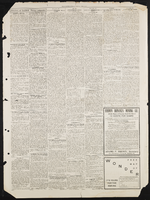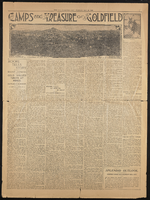Search the Special Collections and Archives Portal
Search Results

Transcript of interview with Sherwin "Scoop" Garside by David Anderson, March 25, 1976
Date
Archival Collection
Description
On March 25, 1976, David Anderson interviewed Sherwin “Scoop” Garside (born May 26, 1915 in Tonopah, Nevada) about his life in Southern Nevada. Garside first talks about his father’s business in running an early Nevada newspaper and his personal knowledge of the early mining that took place in different parts of Nevada. He also talks about living in the town of Tonopah, the American Indians who lived in the area, and his experiences from living in Las Vegas. Garside also mentions the beginnings of gambling in Las Vegas, the population boom periods of Las Vegas, and his experiences in witnessing the aboveground atomic testing.
Text

Transcript of interview with Russell K. Grater by James M. Greene, November 25, 1974
Date
Archival Collection
Description
On November 25, 1974, collector James M. Greene interviewed Russell K. Grater (born November 16th, 1907 in Lebanon, Indiana) in his home in Boulder City, Nevada. This interview offers an overview of the United States Park Service. Mr. Grater also offers an overview on the history of housing developments in the Las Vegas Valley and Nelson Township. The interview concludes with discussion on the leaf system of local plants.
Text

Edith Leavitt interview, February 7, 1977: transcript
Date
Archival Collection
Description
On February 7, 1977, collector Enrico Messina interviewed Edith Leavitt (born April 12th, 1924, in St. George, Utah) at her home in Las Vegas, Nevada. In this interview, Mrs. Leavitt talks about teaching in Southern Nevada, including in the Virgin Valley and in Las Vegas. She also discusses the changing education system in Southern Nevada during her time as an educator.
Text

Interview with Raymond Chester Harbert, October 20, 2005
Date
Archival Collection
Description
Text

Interview with James Keith Magruder, November 22, 2004
Date
Archival Collection
Description
Text

Interview with Stephen Craig Ronshaugen, November 26, 2004
Date
Archival Collection
Description
Text

Interview with Joseph C. Behne, Jr., July 22, 2004
Date
Archival Collection
Description
Text

Patricia Vazquez interview, November 14, 2018, June 14, 2019: transcript
Date
Archival Collection
Description
Session 1: Interviewed by Marcela Rodriguez-Campo. Barbara Tabach also participates in the questioning. Session 2: Interviewed by Rodrigo Vazquez. Monserrath Hernandez also participates in the questioning. Patricia Vazquez was born and raised in Las Vegas, NV and shares her experiences growing up in the Valley as a Queer Latina. At a young age, she remembers traveling back and forth between Mexico and the U.S. to visit family. When she started school she shares how her home language, Spanish, became her family's "secret language" as she began to learn English. During elementary school Patricia was tracked into the special education program, and remove from the mainstream classroom. She would find her love for learning in books and libraries as she taught herself how to read in English. Despite being tracked into less advanced courses, Patricia would end up taking AP/ Honors courses in high school after forging her favorite teachers signature, which changed her educational trajectory. After coming out to her family, Patricia went nearly a decade distanced from her mother and continued her college education at Arizona State University. There, she would complete a bachelors in painting and a masters in comparative literature. Her work with the Chicano Studies program at ASU helped her develop her Chicana identity and begin her involvement in social activism. In Las Vegas, she worked to fight for marriage equality and LGBTQ rights with the American Civil Liberties Union , and later with the Progressive Leadership Alliance of Nevada. She also conducted several lectures for the Latino Youth Leadership Conference on sexuality, gender, and homophobia for over a decade. She has served as an English Professor at the College of Southern Nevada for the last 20 years and is an avid hiker, traveler, and painter.
Text


